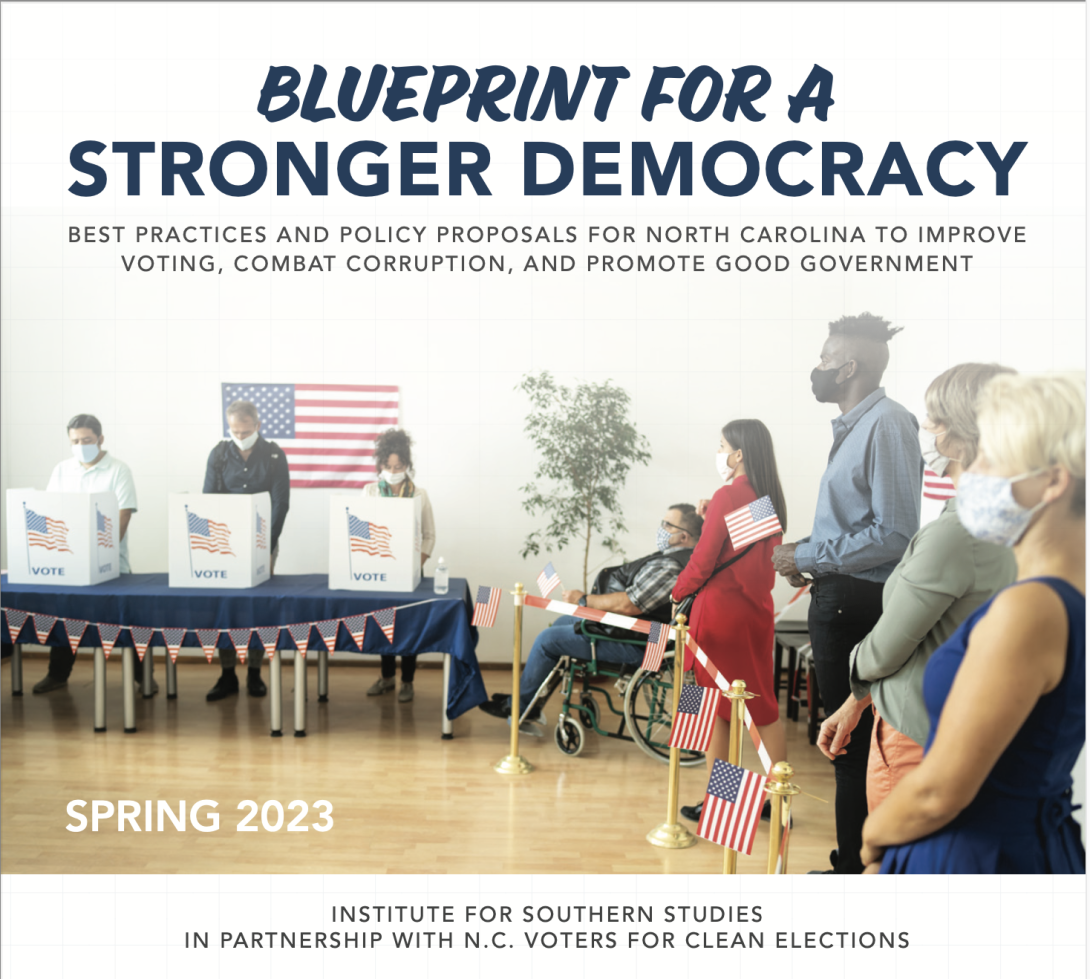North Carolina advocates offer detailed blueprint to strengthen democracy

A new collaborative report offers best practices and solutions on a range of democracy issues, such as voter access, election administration, and ethics laws.
With threats to democracy becoming more rampant and systemic barriers continuing to undermine fundamental democratic institutions and impair voters' ability to cast a ballot, a coalition of advocates and experts have set forth a list of bipartisan policy measures to improve North Carolina's democratic infrastructure and enhance the quality of the state's electoral process.
"Today, our state is a cautionary tale of the threats facing our democracy," the authors noted. "Popular programs our state once embraced, like voter-owned elections to curb Big Money, have been eliminated, and our state has been slow to adopt common-sense measures such as full online voter registration."
In partnership with 15 leading state and national organizations, the new report, "Blueprint for a Stronger Democracy," outlines a series of best practices to preserve and enhance North Carolina's democratic institutions. The proposals examined have been embraced by Democrats and Republicans in other states and address a broad range of democracy issues, such as voter access, election administration, and ethics laws.
This year's report, which is an updated version of an original blueprint produced in 2021, details North Carolina's proud legacy of expanding voting access, improving elections, and strengthening democratic institutions. Two decades ago, with the backing of pro-democracy advocates, lawmakers came together to implement groundbreaking proposals that would enhance and strengthen the state's electoral system, including same-day voter registration during early voting, strong campaign finance disclosure laws, and "voter-owned" public financing of council of state and judicial elections.
However, the experts note that in recent years significant democratic gains in the state have been stifled by an eroding voting infrastructure and systematic attempts to undermine the legitimacy of the electoral process. "Chronic underfunding of basic infrastructure has paired with growing threats of intimidation and subversion to make this a critical moment for our democratic institutions," the authors warned.
The comprehensive report offers two dozen innovative solutions for North Carolina lawmakers to consider. Most have been successfully implemented elsewhere and enjoy "broad public support across partisan and ideological lines," as the report notes. Others are forward-thinking ideas that, if carried out in our state, would place North Carolina at the forefront in defending and expanding democratic engagement.
The more than 20 state and national experts contributing to the report explore initiatives for North Carolina in seven areas:
- Improving voter registration and list maintenance;
- Ensuring voting access and protecting voting rights;
- Strengthening local election infrastructure;
- Defending against election subversion;
- Promoting fair redistricting and equal representation;
- Heightening transparency and combating corruption; and
- Ensuring fair and impartial courts
The report was developed by the Institute for Southern Studies, a nonprofit media, research, and education center based in Durham, North Carolina, and publisher of Facing South, and North Carolina Voters for Clean Elections, a nonpartisan pro-democracy coalition. Contributors to the report include the Brennan Center for Justice, Campaign Legal Center, Common Cause North Carolina, Democracy North Carolina, Disability Rights North Carolina, Fix the Court, Forward Justice, League of Women Voters of North Carolina, North Carolina Asian Americans Together, North Carolina Black Alliance, North Carolina Budget and Tax Center, Southern Coalition for Social Justice, and Voters' Right to Know.
"Democracy shouldn't be a partisan issue," the authors concluded. "Together, we can find workable solutions that bring us closer to the ideal of a state truly of, by, and for the people."
Tags
Benjamin Barber
Benjamin Barber is the democracy program coordinator at the Institute for Southern Studies.
Chris Kromm
Chris Kromm is executive director of the Institute for Southern Studies and publisher of the Institute's online magazine, Facing South.

